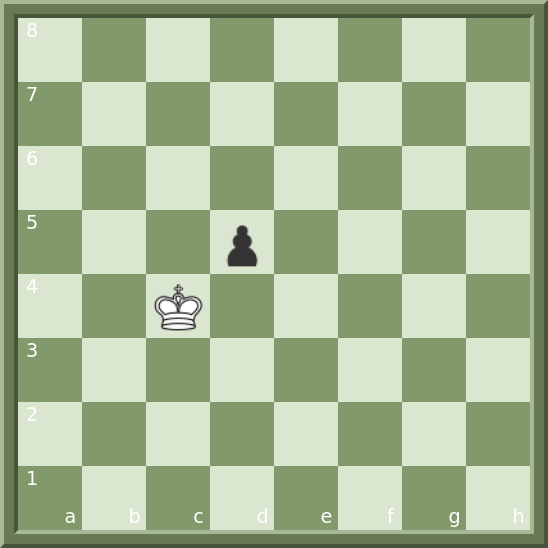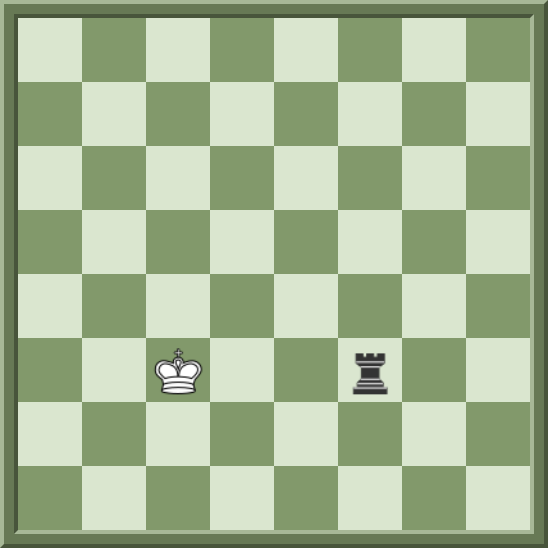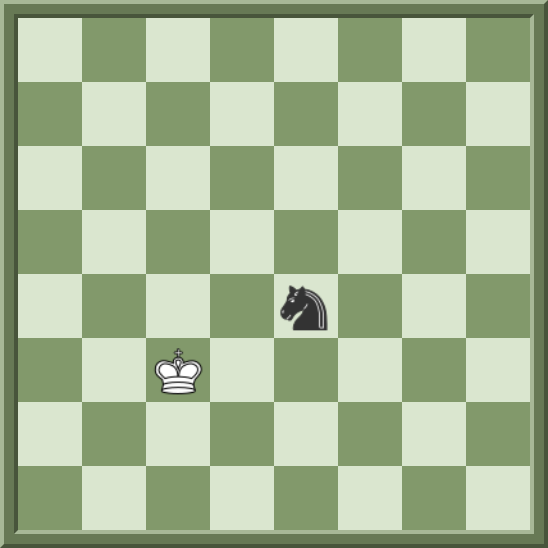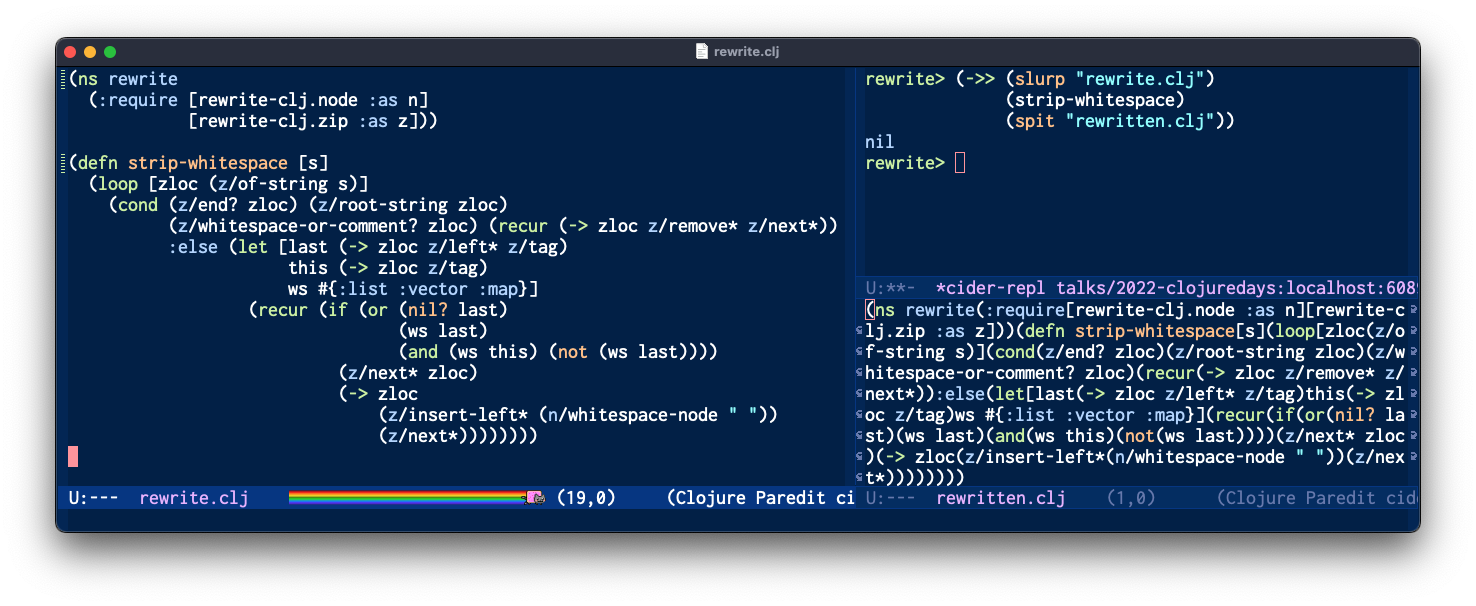

You have to write a function is-check that takes for input a 8x8 chessboard in the form of a bi-dimensional array of strings and returns true if the black king is in check or false if it is not.
The array will include 64 squares which can contain the following characters: '♔', '♛', '♝', '♞', '♜', '♟', ' ' (a space).
There will always be exactly one king, which is the white king, whereas all the other pieces are black.
The board is oriented from White’s perspective.
(deftest check-by-pawn
(is (true? (is-check
[[" "" "" "" "" "" "" "" "]
[" "" "" "" "" "" "" "" "]
[" "" "" "" "" "" "" "" "]
[" "" "" "" "" "" "" "" "]
[" "" "" ""♟"" "" "" "" "]
[" "" ""♔"" "" "" "" "" "]
[" "" "" "" "" "" "" "" "]
[" "" "" "" "" "" "" "" "]]
))))
(ns a)is-checktrue or false
nilString#length()
(def limit 279)
(defn too-long? [solution]
(> (count solution) limit))
(defn solve-golfed [problem]
(let [simple-solution (solve-simply problem)]
(->> (iterate chop-characters simple-solution)
(drop-while too-long?)
(first))))
(defn is-check [board]
(->> (fields board)
(filter has-black-piece?)
(filter checks-white-king?)
first
boolean))
(defn board->map [board]
(->> board
(map-indexed
#(map-indexed
(fn [x y] [[x %] y])
%2))
(apply concat)
(into {})))
(defn is-check [board]
(->> board
board->map
(filter checks-white-king?)
first
boolean))

{[2 4] "♔",
[3 5] "♟",
[0 0] " ",
;; ...
}
(defn coord+ [[x y] [dx dy]]
[(+ x dx) (+ y dy)])
(defn cast [board field delta]
(->> field
(iterate #(coord+ delta %))
next
(map board)
(remove #{" "})
first))
(defn rook-checks? [board field]
(-> (map (partial cast board field)
[[0 1] [0 -1] [1 0] [-1 0]])
set
(contains? "♔")))

(cast b
[5 5]
[-1 0])
;=> "♔"
(defn drop-checks? [coords board field]
(-> (map #(board (coord+ field %))
coords)
set
(contains? "♔")))
(def knight-checks?
(partial drop-checks?
[[1 2] [2 1]
[1 -2] [2 -1]
[-1 -2] [-2 -1]
[-1 2] [-2 1]]))
(def pawn-checks?
(partial drop-checks?
[[1 1] [-1 1]]))

(def piece->checks
{"♝" bishop-checks?
"♜" rook-checks?
"♛" queen-checks?
"♞" knight-checks?
"♟" pawn-checks?})
(defn checks-white-king?
[board [field piece]]
(let [checks? (piece->checks piece (constantly false))]
(checks? board field)))


(ns a)(defn board->map[board](->> board(map-indexed #(map-indexed(fn[x y][[x %]y])%2))(apply concat)(into{})))(defn coord+[[x y][dx dy]][(+ x dx)(+ y dy)])(defn cast[board field delta](->> field(iterate #(coord+ delta %))next(map board)(remove #{" "})first))(defn rook-checks?[board field](->(map(partial cast board field)[[0 1][0 -1][1 0][-1 0]])set(contains?"♔")))(defn bishop-checks?[board field](->(map(partial cast board field)[[1 1][1 -1][-1 -1][-1 1]])set(contains?"♔")))(defn queen-checks?[board field](->(map(partial cast board field)[[1 1][1 -1][-1 -1][-1 1][1 0][0 1][-1 0][0 -1]])set(contains?"♔")))(defn drop-checks?[coords board field](->(map #(board(coord+ field %))coords)set(contains?"♔")))(def knight-checks?(partial drop-checks?[[1 2][2 1][1 -2][2 -1][-1 -2][-2 -1][-1 2][-2 1]]))(def pawn-checks?(partial drop-checks?[[1 1][-1 1]]))(def piece->checks{"♝"bishop-checks?"♜"rook-checks?"♛"queen-checks?"♞"knight-checks?"♟"pawn-checks?})(defn checks-white-king?[board[field piece]](let[checks?(piece->checks piece(constantly false))](checks? board field)))(defn is-check[board](let[board(board->map board)](->> board(filter(partial checks-white-king? board))first boolean)))
(defn attack-checks? [move-fn]
(fn [deltas]
(fn [board field]
((set (map #(move-fn board field %) deltas)) "♔"))))
(def cast-checks?
(attack-checks? cast))
(def drop-checks?
(attack-checks? (fn [board field delta]
(board (coord+ field delta)))))
(def rook-checks?
(cast-checks? [[0 1] [0 -1] [1 0] [-1 0]]))
(def bishop-checks?
(cast-checks? [[1 1] [1 -1] [-1 -1] [-1 1]]))
(def piece->checks
{"♝" bishop-checks?
"♜" rook-checks?
"♛" (some-fn bishop-checks? rook-checks?)
"♞" (drop-checks?
[[1 2] [2 1] [1 -2] [2 -1]
[-1 -2] [-2 -1] [-1 2] [-2 1]])
"♟" (drop-checks? [[1 1] [-1 1]])})
(defn is-check [board]
(let [board (into {} (apply concat (map-indexed #(map-indexed (fn [x y] [[x %] y]) %2) board)))
coord+ #(map + %1 %2)
cast (fn [x y] (first (remove #{" "} (map board (next (iterate #(coord+ x %) y))))))
attack-checks? (fn [g] (fn [P] (fn [f] ((set (map #(g % f) P)) "♔"))))
cast-checks? (attack-checks? cast)
drop-checks? (attack-checks? (comp board coord+))
rook-checks? (cast-checks? [[0 1] [0 -1] [1 0] [-1 0]])
bishop-checks? (cast-checks? [[1 1] [1 -1] [-1 -1] [-1 1]])
check-fns {"♝" bishop-checks?
"♜" rook-checks?
"♛" (some-fn bishop-checks? rook-checks?)
"♞" (drop-checks? [[1 2] [2 1] [1 -2] [2 -1] [-1 -2] [-2 -1] [-1 2] [-2 1]])
"♟" (drop-checks? [[1 1] [-1 1]])}]
(boolean (some boolean (for [[a f] board] ((check-fns f not) a))))))
(defn is-check [b]
(let [b (into {} (apply concat (map-indexed #(map-indexed
(fn [x y] [[x %] y]) %2) b)))
p #(map + %1 %2)
c (fn [x y] (first (remove #{" "} (map b (next (iterate #(p x %) y))))))
a (fn [g] (fn [P] (fn [f] ((set (map #(g % f) P)) "♔"))))
x (a c)
d (a (comp b p))
R (x [[0 1] [0 -1] [1 0] [-1 0]])
B (x [[1 1] [1 -1] [-1 -1] [-1 1]])
m {"♝" B
"♜" R
"♛" (some-fn B R)
"♞" (d [[1 2] [2 1] [1 -2] [2 -1] [-1 -2] [-2 -1] [-1 2] [-2 1]])
"♟" (d [[1 1] [-1 1]])}]
(boolean (some boolean (for [[a f] b] ((m f not) a))))))
(defn is-check [b]
(let [M map-indexed Z boolean
b (into {} (apply concat (M #(M (fn [x y] [[x %] y]) %2) b)))
p #(map + %1 %2)
a (fn [g] (fn [P] (fn [f] ((set (map #(g % f) P)) "♔"))))
x (a (fn [x y] (first (remove #{" "} (map b (next
(iterate #(p x %) y)))))))
d (a (comp b p))
R (x [[0 1] [0 -1] [1 0] [-1 0]])
B (x [[1 1] [1 -1] [-1 -1] [-1 1]])
m {"♝" B
"♜" R
"♛" (some-fn B R)
"♞" (d [[1 2] [2 1] [1 -2] [2 -1]
[-1 -2] [-2 -1] [-1 2] [-2 1]])
"♟" (d [[1 1] [-1 1]])}]
(Z (some Z (for [[a f] b] ((m f not) a))))))
(defn is-check [b]
(let [M map-indexed Z boolean I iterate
b (into {} (apply concat (M #(M (fn [x y] [[x %] y]) %2) b)))
p #(map + %1 %2)
a (fn [g] (fn [P] (fn [f] ((set (map #(g % f) P)) "♔"))))
x (a (fn [x y] (first (remove #{" "} (map b (next
(I #(p x %) y)))))))
d (a (comp b p))
r #(take 4 (I (fn [[x y]] [(- y) x]) %&))
R (x (r 0 1))
B (x (r 1 1))
m {"♝" B "♜" R "♛" (some-fn B R)
"♞" (d (into (r 1 2) (r 2 1)))
"♟" (d [[1 1] [-1 1]])}]
(Z (some Z (for [[a f] b] ((m f not) a))))))
(defn is-check [b]
(let [M map-indexed Z boolean I iterate
b (into {} (apply concat (M #(M (fn [x y] [[x %] y]) %2) b)))
p #(map + %1 %2)
a (fn [g] (fn [P] (fn [f] ((set (map #(g % f) P)) "\u2654"))))
x (a (fn [x y] (first (remove #{" "} (map b (next
(I #(p x %) y)))))))
d (a (comp b p))
r #(take 4 (I (fn [[x y]] [(- y) x]) %&))
R (x (r 0 1))
B (x (r 1 1))
m {"\u265d" B "\u265c" R "\u265b" (some-fn B R)
"\u265e" (d (into (r 1 2) (r 2 1)))
"\u265f" (d [[1 1] [-1 1]])}]
(Z (some Z (for [[a f] b] ((m f not) a))))))
(defn is-check [b]
(let [M map-indexed Z boolean I iterate
b (into {} (apply concat (M #(M (fn [x y]
[[x %] (mod (int (first y)) 14)]) %2) b)))
p #(map + %1 %2)
a (fn [g] (fn [P] (fn [f] ((set (map #(g % f) P)) 12))))
x (a (fn [x y] (first (remove #{4} (map b (next
(I #(p x %) y)))))))
d (a (comp b p))
r #(take 4 (I (fn [[x y]] [(- y) x]) %&))
R (x (r 0 1))
B (x (r 1 1))
m {7 B 6 R 5 (some-fn B R)
8 (d (into (r 1 2) (r 2 1)))
9 (d [[1 1] [-1 1]])}]
(Z (some Z (for [[a f] b] ((m f not) a))))))
(defn is-check [b]
(let [M map-indexed Z boolean I iterate
b (into {} (apply concat (M #(M (fn [x y]
[[x %] (mod (int (first y)) 14)]) %2) b)))
p #(map + % %2)
a (fn [g] (fn [P] (fn [f] ((set (map #(g % f) P)) 12))))
x (a (fn [x y] (first (remove #{4} (map b (next
(I #(p x %) y)))))))
d (a (comp b p))
r #(take 4 (I (fn [[x y]] [(- y) x]) %&))
R (x (r 0 1))
B (x (r 1 1))
m {6 R 5 (some-fn B R)
8 (d (into (r 1 2) (r 2 1)))
9 (d [[1 1] [-1 1]]) 7 B}]
(Z (some Z (for [[a f] b] ((m f not) a))))))
(defn is-check [b]
(let [q (range 8)
b (zipmap (for [x q y q] [y x])
(for [[x] (flatten b)]
(mod (int x) 14)))
p #(map + % %2)
a (fn [g] (fn [P] (fn [f] ((set (map #(g % f) P)) 12))))
x (a (fn [x y]
(loop [a (p x y)]
(if (= (b a) 4) (recur (p x a)) (b a)))))
d (a (comp b p))
r #(partition 2 1 [% %2 (- %) (- %2) %])
v (r -1 1)
R (x (r 0 1))]
(not-every? not
(for [[a f] b]
(({5 (some-fn (x v) R), 8 (d (into (r 1 2) (r 2 1))),
9 (d (take 2 v)), 7 (x v), 6 R} f not)
a)))))
2 ASCII characters -> 1 UTF-16 code unit
(defn compress [s]
(->> s
.getBytes
(partition-all 2)
(map (fn [[a b]] (+ (* 128 a) b)))
(map #(Character/toString %))
(apply str)))
(->> "COMPRESSED CODE"
(mapcat #((juxt / mod) (int %) 128))
byte-array
String.
read-string
eval)
(ns a)(->>"ᑤ㋦㜠㓳ᛣ㑥ⷢ⺨㙥㩛㢨㥡㝧㊠ᰩㄨ㵩㡭ヰᑦ㟲ⷸၱၹၱ⻛㲠㱝ᒨ㍯㥛ⷸ⺨㍬ヴ㩥㜠ㄩ⺨㛯㈨㓮㨠㰩ᢴᒩᓰဣᑭヰါဥဥᤩエ㍮ⷧ⺨㍮ⷐ⺨㍮ⷦ⺨ᑳ㋴ᑭヰဣᑧဥၦᓐᒩᢲᒩᒩ㰨エ㍮ⷸၹ⺨㙯㟰ⷡᑰၸၹᓝᑩ㌨Ẩㄠォᨩᑲ㋣㫲ᑰၸၡᒩᑢၡᒩᒩᓤᑡᑣ㟭㠠ㄠ㠩ᓲဣᑰヲ㩩㩩㟮ဲေⶥဥᤨᚠኩᐭဥᤩዝᓶᑲိᢠᢩ⤨㰨㤠ᠠᢩᓝᑮ㟴ᛥ㭥㥹ᾠ㝯㨨㍯㥛ⷡၦ⻢⺨ᑻ᪨㧯㛥ᛦ㜨㰠㬩⤩ᰨ㈨㓮㩯ᑲေဲᒨ㤠ᤠᢩᒩᲨ㈨㩡㗥ဲၶᒩᮨ㰠㬩ᬠ⥽㌠㝯㨩ォᒩᒩ"(mapcat #((juxt / mod)(int %)128))byte-array String. read-string eval)
(ns a)(defn is-check[b](let[r(range 8)z #(first(get-in b %))](=\♔(some #{\♔}(for[i r j r[p u]{\♟[[1 -1]]\♝[[1 -1]]\♜[[0 -1]]\♛[[0 1]]}s u :when(#{p}(z[i j]))](z(first(drop-while #(if(#{\♝\♜\♛}p)(=\space(z %)))(next(iterate(partial map + s)[i j]))))))))))